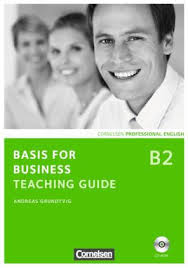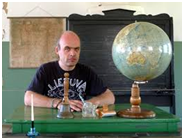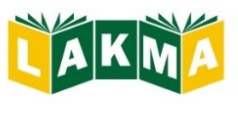
Andreas Grundtvig
Teacher Trainer, Author, IATEFL Presenter and Education Consultant based in Hamburg. Andreas grew up in the U.K. and since 1994 has worked in Spain, Lithuania, Portugal, France and Germany. He is passionate about learner autonomy, pragmatics and imaginative learning. His books for the Basis for Business series (Cornelsen) were illustrated by his Lithuanian wife Alma.

In April 2014, the Lithuanian Association of teachers of English as a Foreign Language LAKMA hosted two workshops by Andreas Grundtvig for English language teachers of Lithuania. The topics included “Linguistic Politeness in General and Business Communication” and “CLIL Projects: Creativity and Motivation”. As a follow-up, Andreas talks about the issues raised by workshop participants.
1. What could we do to motivate our students to learn? The first thing you have to do is to ask yourself: are you genuinely interested in the focus of the lesson? If you aren’t then the students will pick up on that immediately and you will lose them. Similarly, in training sessions I regularly emphasise the need to take the time to find out what makes your students tick – i.e. find out what they are interested in and what their reasons are for wanting to learn. In so doing you make your lessons ‘real’ and help students understand the relevance of what they are learning.
In Business English classes don’t go in blind but ask the students to provide authentic examples of the language they deal with daily, this could be something as simple as an example of the emails they receive. These will help you identify their needs. As for younger learners I’ve recently started spending a lot more time outside of the classroom – taking them for walks and using their environment as a real life prop. This often introduces vocabulary that I would otherwise have forgotten in the classroom. As for knowing what works well for different ages, I find Kieran Egan’s intellectual stages or ‘understandings’ provide an invaluable guideline (See the ierg.net website for ideas and resources).
2. What do you think of the view that the best way to motivate children to learn is to use ICT? I think that a sure way to demotivate your students is by banning the tools that they are all so keen to use. Take mobile phones, for example, I know of many teachers who ban these from the classroom because they think they can be disruptive. While I agree that this is true when it comes to taking calls or sending messages, I also encounter more and more students who have downloaded language apps in their free time to help them learn. Personally, rather than punishing them for their initiative I prefer to encourage students to use whatever resources work for them. Encourage them to use dictionaries by all means, but if they prefer using an app such as the Oxford Advanced Learner’s 8, why not let them? Publishers invest so much time in designing apps to make learning fun, perhaps by encouraging your students and showing them just some of these you will not only motivate them but help change their attitude to self- study.
3. What do you like about teaching? The ‘aha’ moments! The times when I’m able to make something which was previously confusing both understandable and memorable. It doesn’t happen in every class, of course, but when it does it gives me a nice buzz. I also enjoy the times when I feel I’ve really been able to connect with my students and create a feeling of being ‘in this together’. Not only is that a motivational boost for them, but for me as teacher too.
4. What can you call the teacher’s best friend – inspiration, good education or creativity? All are important but above all it has to be the ability to connect with your students. The teacher’s voice and manner can be their best friend but also their worst enemy depending on how it’s used. It’s important to recognise that. Teachers may have the best education and be incredibly creative but if they cannot identify with their students then the power of these is lost.
5. What would you do if you were not a teacher / teacher trainer? I recently did a silly internet quiz to find out and wasn’t surprised by the answer. If I did not teach I would write. As it is I’m able to do both but I would like to have more time for creative writing. That’s one of the things I intend to do when I spend this summer at my sodyba near Zarasai but as John Lennon said ‘life is what happens to you when you’re busy making other plans’.
6. How did you decide to write your book ‘Basis for Business’? This was really a string of lucky events. When I first started teaching in Spain, twenty years ago, I had very few resources available to me and so began creating my own. Over the years I learnt to understand what worked and built a good bank of materials. One day took the plunge and sent some examples of my activities to a publisher. The publisher liked them a lot and asked me to help revamp the Business English for Beginners series and that’s what led to Basis for Beginners. When asked to write my own book I asked my wife Alma, who studied design in Kaunas, to illustrate my activities so I see these books as not just mine but ours.
7. Are you working on another book? If so, what is it about? What is the title? Yes, pragmatics, the difference between what we say and what we mean, in the L2 classroom is my baby! I’ve presented different aspects of this topic for several years now (including my workshop for LAKMA in Vilnius) and continue to run training days. It always generates a lot of discussion. There is a resource book in the pipeline, watch this space! 😉
8. What is Playlands.org? He he, some years ago I had some intensive courses with a group of young mixed ability teenagers in Portugal and France. One day we read the quirky story of the Principality of Sealand (a sea-fort off the coast of England that has become an independent micronation) and I thought it might be fun for these kids to set up a nation of their own. The idea clicked immediately with the students and I thought the work they produced was wonderfully creative as well as cross-curricular – we looked at the geographical characteristics of countries, the design of flags and architecture, flora and fauna of different habitats, national anthems and even currency and trade which would otherwise come at a much later age.
When my Director of Studies, who had been away for a quiet holiday, came back to find a whole wall of his school dedicated to the Kingdom of Playland he wasn’t quite sure what to make of it all. It’s then I realised that perhaps we needed another way to present the work. So I opted for an online presence. I already had a website and it was easy to rename it. This also gave the project much more visibility. When the Playlanders realised that countries needed recognition from other nations they started contacting other micronations. They were thrilled when they received an official document from the Prince of Sealand to show his support. One thing led to another and the project was eventually commended by the BBC and even Kieran Egan wrote to say he thought the project was ‘an astonishing construction–imaginative and enormously engaging’ and that he had been ‘delighted to visit Playland’. ‘It is wonderfully elaborate, and I can only imagine it was wonderful for the children to be involved in its construction.’ he added.
You can still see that project by going to www.playlands.org and clicking on ‘The Kingdom of Playland’. It is also still my website, so you’ll find other things there such as a bunch of resources from the Basis for Business series.
9. What is your impression of the English language teachers in Lithuania? How do we compare to other groups of your trainees? I used to teach in Vilnius and remember those days with much fondness. The impression I got on my recent visits to Vilnius and Siauliai for LAKMA was the same as the one I got of my Lithuanian students back then: initially very quiet and reserved but as I earned their trust and confidence, wonderfully receptive. I hope to see you all again soon. Please stay in touch.
